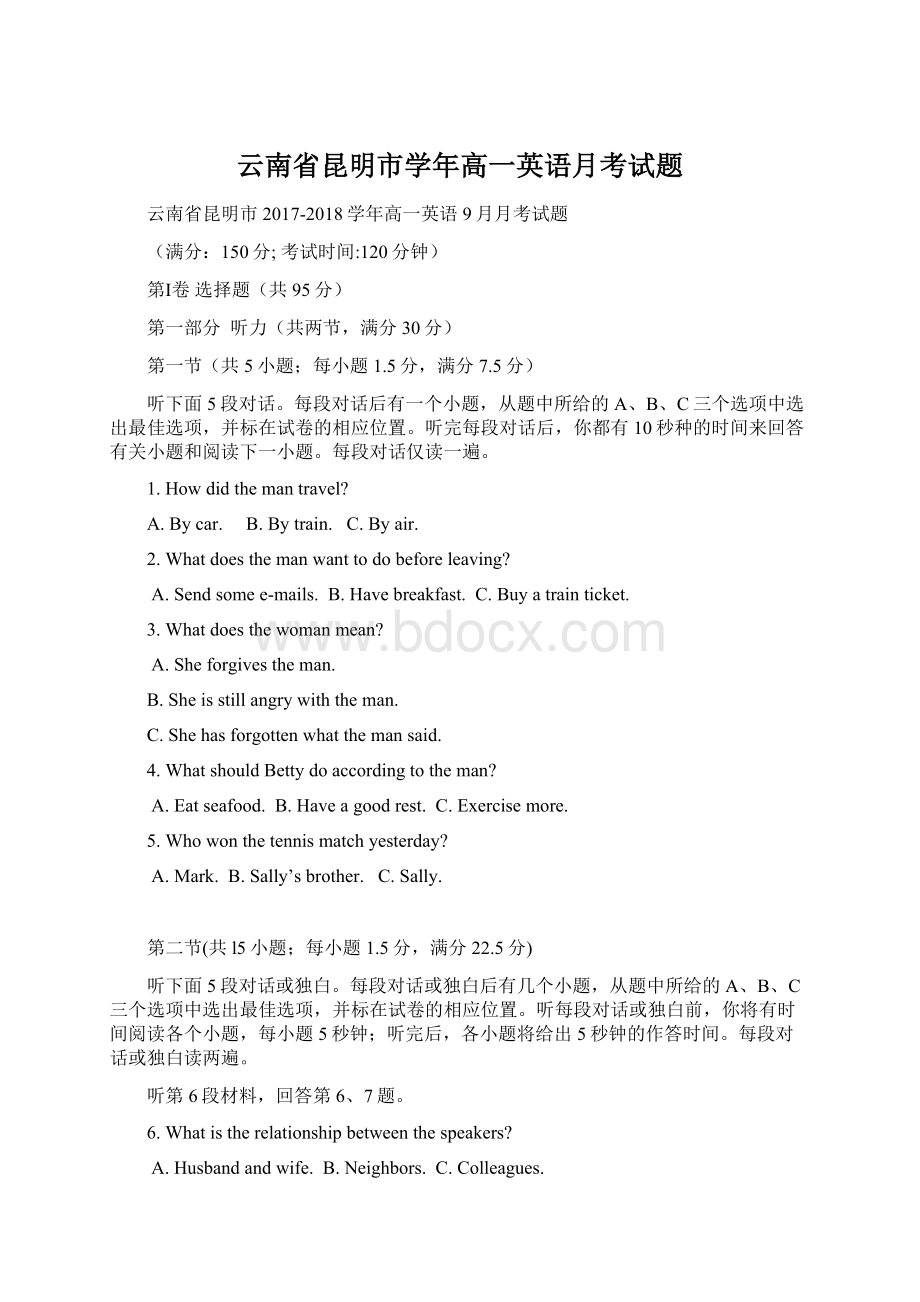云南省昆明市学年高一英语月考试题.docx
《云南省昆明市学年高一英语月考试题.docx》由会员分享,可在线阅读,更多相关《云南省昆明市学年高一英语月考试题.docx(12页珍藏版)》请在冰豆网上搜索。

云南省昆明市学年高一英语月考试题
云南省昆明市2017-2018学年高一英语9月月考试题
(满分:
150分;考试时间:
120分钟)
第Ⅰ卷选择题(共95分)
第一部分 听力(共两节,满分30分)
第一节(共5小题;每小题1.5分,满分7.5分)
听下面5段对话。
每段对话后有一个小题,从题中所给的A、B、C三个选项中选出最佳选项,并标在试卷的相应位置。
听完每段对话后,你都有10秒种的时间来回答有关小题和阅读下一小题。
每段对话仅读一遍。
1.Howdidthemantravel?
A.Bycar.B.Bytrain.C.Byair.
2.Whatdoesthemanwanttodobeforeleaving?
A.Sendsomee-mails.B.Havebreakfast.C.Buyatrainticket.
3.Whatdoesthewomanmean?
A.Sheforgivestheman.
B.Sheisstillangrywiththeman.
C.Shehasforgottenwhatthemansaid.
4.WhatshouldBettydoaccordingtotheman?
A.Eatseafood.B.Haveagoodrest.C.Exercisemore.
5.Whowonthetennismatchyesterday?
A.Mark.B.Sally’sbrother.C.Sally.
第二节(共l5小题;每小题1.5分,满分22.5分)
听下面5段对话或独白。
每段对话或独白后有几个小题,从题中所给的A、B、C三个选项中选出最佳选项,并标在试卷的相应位置。
听每段对话或独白前,你将有时间阅读各个小题,每小题5秒钟;听完后,各小题将给出5秒钟的作答时间。
每段对话或独白读两遍。
听第6段材料,回答第6、7题。
6.Whatistherelationshipbetweenthespeakers?
A.Husbandandwife.B.Neighbors.C.Colleagues.
7.Whatnamedoesthewomanwanttogivethebaby?
A.Robert.B.Albert.C.Lawrence.
听第7段材料,回答第8至第10题。
8.Whendoestheconversationtakeplace?
A.Inthemorning.B.Intheafternoon.C.Intheevening.
9.What’stheman’shealthinsurancenumber?
A.2658A.B.88564802.C.5559008.
10.What’stheman’sproblem?
A.Hisbackhurts.B.Hehasafever.C.Hehasastomachache.
听第8段材料,回答第11至第14题。
11.Whatdoesthemansayaboutthehotel?
A.Thefoodwasgreat.
B.Hewassurprisedaboutthefridge.
C.Thebedswerenotverycomfortable.
12.Whenisthepoolopen?
A.Atsixo’clockinthemorning.
B.Atfiveo’clockintheafternoon.
C.Ateighto’clockintheevening.
13.Howmuchshouldthemanpay?
A.$116.B.$130.C.$160.
14.Howwillthemanpayforthebill?
A.Bycreditcard.B.Bytraveler’scheck.C.Incash.
听第9段材料,回答第15至第17题。
15.Whatarethespeakersdoing?
A.Visitingacollege.B.Attendingaparty.C.Attendingaclub.
16.Wherewasthewomanborn?
A.InGermany.B.InAmerica.C.InBritain.
17.WhatdoesthemaninvitethewomantodonextMonday?
A.Visitamuseum.B.Havedinnerwithhim.C.Seeanexhibition.
听第10段材料,回答第18至20题。
18.Whoisthespeaker?
A.Anairhostess.B.Atourguide.C.Anairlineclerk.
19.WhatshouldMr.Jonesdowhenhechecksin?
A.Showhisticketandpassportandweighhisluggage.
B.Openhisluggageandhaveitchecked.
C.Checkinhishandluggagefirst.
20.Whatisthespeakertalkingaboutatlast?
A.Thedeparturetax(离境税).B.Thearrivaltime.C.Theseatnumber.
第二部分单项填空,从四个选项中选择最佳选项。
(每小题1分,共15分)
1.Ihappenedtobedownstairs_____whenthedoorwasopen.
A.onduskB.attheduskC.induskD.atdusk
2.Ineedto_______mythingsinthesuitcaseveryquickly.
A.pickupB.packupC.takeupD.putup
3.Iwassoexcitedasto________forthewholenight.
A.holdawakeB.holdwakeC.stayawakeD.staywake
4.SinceMargotfounditdifficulttosettleinanewplace,shefelt______thatthefamilyhadtomove.
A.upsetB.crazyC.happyD.easy
5.WhenIcame______withtheteenagerhiddeninthecave,Iwassurprisedtofindhim_____coveredwithdust.
A.face-to-face;entirelyB.facetoface;entireC.facetoface;entirelyD.infaceof;completely
6.MrStantonbecame_____ofthe_____speech,sohebegantoreadanovel.
A.tired,boringB.tiring,boredC.tired,boredD.tiring,boring
7.—Oh,it’syou!
Ididn’t________you.
—Wehaven’tseeneachotherforseveralyears.Gladtomeetyouagain.
A.realizeB.seeC.knowD.recognize
8.It’s_______hothere.Wecan’tstayhereforalongtime.
A.muchB.verymuchC.muchtooD.toomuch
9.Wecan’tgiveup________weshouldfail10times.
A.evenifB.sinceC.whetherD.until
10.Myeldersisteris_______studyinginBritainandshecanspeakEnglishquitefluentlylikeanativespeaker.
A.inthepresentB.atpresentC.atthepresentD.forthepresent
11.Someminority(少数民族)languagesarelosingtheir______becauseoftheinvasion(入侵)ofmorepopularspokenones.
A.ideasB.identitiesC.naturesD.characters
12.DifferentpeoplefromdifferentprovincesspeakEnglish_____differentaccents.
A.inB.byC.withD.on
13.—Haveyouboughtthedictionary?
—No.Ihave________twoyuanonme.
A.morethanB.moreoverC.overD.nomorethan
14.AmericanEnglishismoreorlessdifferent_____BritishEnglish______pronunciationandspelling.
A.from;inB.with;inC.from;withD.with;on
15.—Ididn’tknowthiswasaonewaystreet,officer.
—________
A.That’sallright.B.Idon’tbelieveyou.
C.Howdareyousaythat?
D.Sorry,butthat’snoexcuse.
第三部分阅读理解(共两节,满分30分)
第一节(共10小题;每小题2分,满分20分)
阅读下列短文,从每题所给的四个选项(A、B、C、和D)中,选出最佳选项。
A
Inordertoknowaforeignlanguagethoroughly(完全地),fourthingsarenecessary.First,wemustunderstandthelanguagewhenwehearitspoken.Secondly,wemustbeabletospeakitourselves,correctlywithconfidence(自信)andwithouthesitation(犹豫).Thirdly,wemustbeabletowriteit.WemustbeabletomakesentencesthatarecorrectinGrammar.
Thereisnoshortwaytosucceedinlanguagelearning.Agoodmemory(记忆)isagreathelp,butitisnotenoughonlytomemorizetherulesfromaGrammarbook.Itisnomuchuselearningbyheartlonglists(一览表)ofwordsandtheirmeanings,studyingthedictionaryandsoon.Wemustlearnbyusingthelanguage.Ifwearepleasedwithafewruleswehavememorized,wearenotreallylearningthelanguage.Wemust“Learnthroughuse”.Practiceisimportant.Wemustpractisespeakingandwritingthelanguagewhenever(无论何时)wecan.
1.Themostimportantthingstolearnaforeignlanguageare__________.
A.understandingandspeaking
B.hearing,speaking,Readingandwriting
C.writingandunderstanding
D.memorizingandlistening
2.SomeonehearsandwritesEnglishverywell,buthespeaksitverybadly.Thisisbecause__________.
A.hedoesn’tunderstandthelanguagewhen
hehearsitspoken
B.hedoesn’thaveagoodmemory
C.healwaysrememberlistsofwordsandtheirmeanings
D.heoftenhesitatestopractisespeakingit
3.“Learnthroughuse”means__________.
A.weusealanguageinordertolearnit
B.welearnaforeignlanguageinordertouseit
C.wecanlearnalanguagewellwhileweareusingit
D.bothBandC
B
Henryfoundworkinabookstoreafterhefinishedmiddleschool.Hewouldn’tdoanythingbutwantedtogetrich.MrKingthoughthewastoolazyandwasgoingtosendhimaway.Henrywasafraidandhadtoworkhard.
Itwasacoldmorning.Itwassnowingandtherewasthiniceonthestreets.Fewpeoplewenttobuythebooksandtheyoungmanhadnothingtodo.Hehatedtoread,sohewatchedthetraffic.Suddenlyhesawabagfalloffatruckanditlandedbytheothersideofthestreet.
“Itmustbefullofexpensivethings,”Henrysaidtohimself.“Ihavetogetit,orotherswilltakeitaway.”
Hewentoutoftheshopandranacrossthestreet.Adriversawhimandbegantowhistle(鸣笛),buthedidn’thearitandwentonrunning.Themandroveaside,hitabigtreeandwashurtintheaccident.TwoweekslaterHenrywastakentocourt(法庭).Ajudgeaskedifheheardthewhistlewhenhewasrunningacrossthestreet.Hesaidthatsomethingwaswrongwithhisearsandhecouldhearnothing.
“Butyou’veheardmethistime.”saidthejudge.
“Oh,I’msorry.NowIcanhearwithoneear.”
“Covertheearwithyourhandandlistentomewithyourdeaf(聋的)one.Well,canyouhearme?
”
“No,Ican’t.sir.”
4.WhatwasMr.King?
A.adriverB.adoctorC.apolicemanD.ashopkeeper.
5.WhydidMr.KingwanttosendHenryaway?
A.BecauseHenrywastoolazy.
B.BecauseHenryhopedtoberich.
C.BecauseHenryfinishedmiddleschool.
D.BecauseHenrysoldfewbooks.
6.Thedriverwasafraidto_______,sohedroveaside.
A.hitHenryB.hurthimselfC.fallbehindD.losethebag
7.Whatdoestheunderlinedword“judge”meaninChinese?
A.裁判B.律师C.法官D.原告
8.WhydidHenrysaythathewasdeaf?
A.Hewantedtohaveajokewiththejudge.
B.Hewantedtogetthejudge’shelp
C.Hewantedtofindanotherpieceofwork
D.Hedidn’twanttopayfortheaccident.
C
Languagesarealwayschanging.TheEnglishoftodayisverydifferentfromtheEnglishof500yeasago.Intime,somelanguagesbecomemoreimportantandothersbecomelessimportant.Someevendieoutcompletely.About1,000yearsagoEnglishwasalittleknownlanguage.
Ifalanguagehasalargenumberofspeakers,orifitisveryold,theremaybedifferencesinthewayitisspokenindifferentareas.Thatis,thelanguagemayhaveseveraldialects.Chineseisagoodexampleofdialectdifferences.Chinesehasbeenspokenforthousandsofyearsbymanymillionsofspeakers.ThedifferencesbetweenthedialectsofChinesearesogreatthatspeakersofChinesefromsomepartsofChinacannotunderstandeachother.
Thereareotherkindsofdialects.Insomelanguageswefindwordsorexpressionsandevengrammaticalformswhichareusedonlybymenandothersusedbywomen.What'smore,eachgeneration(一代人)usesitsownexpressionsandgrandparentsandgrandchildrenmaysometimeshavedifficultyinunderstandingeachother.
9.TheEnglishoftodayisquitedifferentfromthatof500yearsagobecause_______.
A.peoplearenolongerwhattheywere
B.languagesarechangingallthetime
C.itdevelopsatgreatspeed
D.ithasmanyspeakerstouseitaroundtheworld
10.Peopleofthesamecountrymayfinditdifficulttounderstandeachotherbecause_______.
A.somepeoplearenotopenenough
B.theydon'tliketospeaktoeachother
C.theyspeakindifferentways
D.theyhavedifferentopinions
第